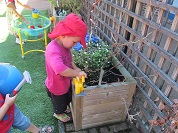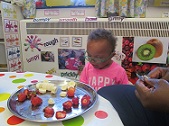 Today was my second visit to services as part of our Week of Action for children and young people. Maria Godfrey, Early Intervention Manager for North Oxfordshire was my guide for the day. With a professional background in Social Work Maria was the perfect guide, with a massive depth of knowledge about Early Intervention Services (EIS) and bursting with enthusiasm and pride in her staff and the services that are delivered.
Today was my second visit to services as part of our Week of Action for children and young people. Maria Godfrey, Early Intervention Manager for North Oxfordshire was my guide for the day. With a professional background in Social Work Maria was the perfect guide, with a massive depth of knowledge about Early Intervention Services (EIS) and bursting with enthusiasm and pride in her staff and the services that are delivered.
The EIS in Oxfordshire is delivered through seven hubs and 44 children’s centres. Families with children from 0-19 years (or up to 25 years if there are special educational needs) can receive intensive support from the service.
I met with staff from the early intervention hub in Banbury and children’s centres in Banbury, Oxford and Didcot during my day. In general, the centres deliver multi-disciplinary services working alongside teachers, social workers, family support workers, play workers, health visitors, midwives, psychotherapists and speech and language therapists, to name but a few.
 Common features of each children centre is the delivery of parenting courses, support with breast feeding, crèche and play group facilities, stay and play sessions (including sessions especially for dads) as well as support for parents around cookery, budgeting, assertiveness training, job clubs and help with housing. Specialist courses including freedom programme are provided for parents and children who have been subjected to domestic violence. Centres have access to specialist services including the Oxford Parent Infant Project (OXPIP) – a therapeutic service that helps parents form a loving bonding relationship with their children, and is particularly helpful for mothers with postnatal depression.
Common features of each children centre is the delivery of parenting courses, support with breast feeding, crèche and play group facilities, stay and play sessions (including sessions especially for dads) as well as support for parents around cookery, budgeting, assertiveness training, job clubs and help with housing. Specialist courses including freedom programme are provided for parents and children who have been subjected to domestic violence. Centres have access to specialist services including the Oxford Parent Infant Project (OXPIP) – a therapeutic service that helps parents form a loving bonding relationship with their children, and is particularly helpful for mothers with postnatal depression.
The Hubs offer same level of family support as the Children's centres but the focus is more on the needs of older children, this includes regular open access youth groups, parenting support including delivery of specialist parenting programmes, support with drug and alcohol issues community outreach, counselling services and access to education and employment. They also provide diversion activities to prevent young people from entering the youth justice system, and restorative practice which help offenders to take responsibility for their actions and offer support to victims of crime.
It became clear that the services provided at each centre were slightly different in each case, depending on the needs of the community. Each centre works with the most vulnerable children and their families in the area (centres are working with 64% of children who are on Child Protection plans). Other children may be Children in Need, Looked After Children or children and families with increased levels of vulnerability, such as those with learning disabilities, physical disabilities or who are struggling at school with attendance or behavioural issues.
 The common factor with the centres was how they had managed to successfully engage with families who are the hardest to reach. These are families who might have had difficult encounters with authorities in the past and as a result were reluctant to engage with services that had been set up to help them. Engaging with these families and gaining their trust is the most difficult part of the job. The process of building a strong relationship with families is a slow one, which starts with providing non-stigmatising services in pleasant surroundings in the heart of communities. Support for families often starts with practical help, such as assistance with claiming benefits, access to food banks and child care facilities. Staff are expert in gaining the trust of families and slowly encouraging them to try out some of the services that are on offer to them.
The common factor with the centres was how they had managed to successfully engage with families who are the hardest to reach. These are families who might have had difficult encounters with authorities in the past and as a result were reluctant to engage with services that had been set up to help them. Engaging with these families and gaining their trust is the most difficult part of the job. The process of building a strong relationship with families is a slow one, which starts with providing non-stigmatising services in pleasant surroundings in the heart of communities. Support for families often starts with practical help, such as assistance with claiming benefits, access to food banks and child care facilities. Staff are expert in gaining the trust of families and slowly encouraging them to try out some of the services that are on offer to them.
The Common Assessment Framework (CAF) is used by all professionals involved in children’s services across health, social care and education. It is a holistic assessment of a child’s needs and strengths and takes into account parenting and environmental factors. It is a key tool and driver for delivering integrated services, bringing together all relevant professionals to form a Team Around the Child (TAC) or Team Around the Family (TAF) a wrap around service that has a protective and nurturing effect on the child and their family, providing the best opportunity for ensuring that children reach their full potential in life.
 The work of staff in Early Intervention Services is highly skilled and benefits not just the families that they help but also the wider society. The neglected children of today become the poor parents of tomorrow and breaking that cycle benefits us all. This is a cause that is too important to ignore.
The work of staff in Early Intervention Services is highly skilled and benefits not just the families that they help but also the wider society. The neglected children of today become the poor parents of tomorrow and breaking that cycle benefits us all. This is a cause that is too important to ignore.
For more information visit: https://www.oxfordshire.gov.uk/cms/public-site/early-intervention-service
Jean Christensen is Professional Officer for Nursing & Midwifery and Care at the Department of Health
